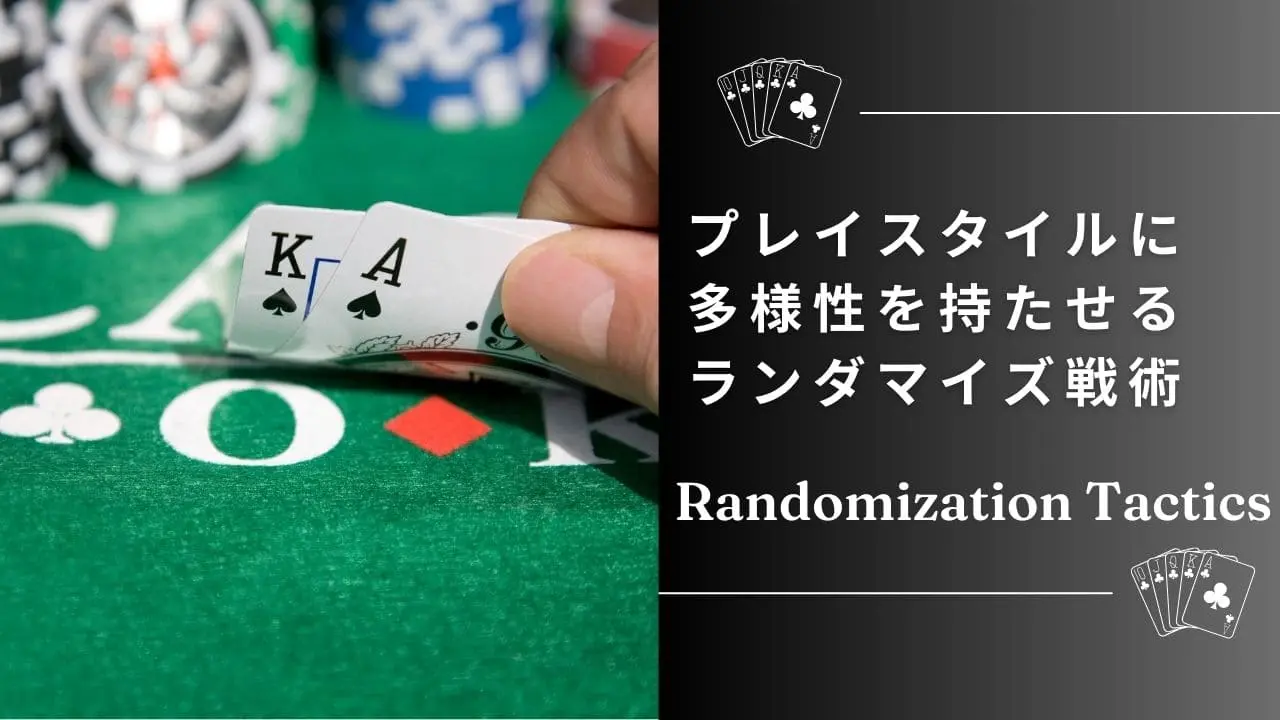Poker is not just a game of luck; it involves strategy and psychological warfare. One of the key elements of success is the ability to read your opponent’s thoughts. However, even the best players can become predictable if they stick to the same playstyle. This is where the “randomization strategy” comes into play.
Randomization helps you keep your playstyle unpredictable, making it difficult for opponents to read your moves. This article will cover the fundamentals of randomization, practical applications, and the risks associated with this strategy. Whether you’re a beginner or an experienced player, mastering randomization can significantly enhance your poker skills.
What is Randomization?
Randomization in poker refers to deliberately varying your playstyle to prevent opponents from predicting your actions. In poker, reading an opponent’s hand plays a crucial role in decision-making. If your moves become predictable, skilled opponents will adjust their strategies to counter you. For example, if you always make large bets with strong hands and small bets with weak hands, your opponents will easily recognize this pattern and exploit it.
By introducing randomness, you can keep your opponents guessing. For instance, sometimes betting small with a strong hand or making a large bet with a weak hand can disrupt your opponent’s expectations and create confusion. Effectively using this technique will give you a significant advantage.
Why is Randomization Important?
A consistent playstyle can be a strength, but it also makes you vulnerable once opponents recognize your patterns. By studying your opponent’s playstyle while keeping your own unpredictable, you gain a major advantage.
For example, if an opponent always makes large bets with strong hands, you can easily exploit their pattern. Conversely, if you always behave predictably, your opponents can do the same to you. Using randomization effectively makes it harder for your opponents to make accurate reads, putting psychological pressure on them and increasing the chances of forcing them into mistakes.
Key Benefits of Randomization:
- Prevents opponents from reading your hand strength
- Creates psychological pressure and forces mistakes
- Keeps your strategy flexible and adaptable
How to Implement Randomization in Poker
1. Randomizing Bet Sizes
Instead of always betting large with strong hands and small with weak ones, mix up your betting sizes.
Example:
- Holding pocket Aces (AA), instead of making a large bet, try a smaller bet to lure your opponent into taking the lead.
- Holding a weak hand, occasionally making a large bet can pressure your opponent into folding.
By varying your bet sizes, your opponents will struggle to recognize a pattern, making it difficult for them to adjust their strategies against you.
2. Randomizing Actions
In situations where you typically bet, consider checking or calling instead. Conversely, bluffing with an aggressive action when holding a weak hand can keep opponents off balance.
Example:
- With pocket Kings (KK), instead of betting aggressively, check and let your opponent bet first, giving you an opportunity to trap them.
- With a weak hand, going all-in unexpectedly can confuse opponents, making them question whether you have a strong hand or are simply bluffing.
3. Randomizing Hand Play
Vary how you play the same hands to avoid being predictable.
Example:
- If you bluff with weak hands, also occasionally check or call with strong hands to maintain unpredictability.
- A mix of aggressive and passive plays keeps opponents from identifying a clear strategy.
Tips for Effective Randomization
1. Choose the Right Timing
Randomization should be used strategically, especially when you sense that an opponent is beginning to recognize your patterns.
2. Avoid Overusing Randomization
Excessive randomization can make your playstyle chaotic and lead to unnecessary risks. Use it as a tool to create unpredictability rather than relying on it exclusively.
3. Adapt to Your Opponent’s Playstyle
- Against tight players who fold often, bluffing with randomization can be effective.
- Against aggressive players, adopting a more defensive, unpredictable strategy can help you exploit their overconfidence.
Psychological Aspects of Randomization
Beyond strategy, randomization has a powerful psychological impact on opponents. When they cannot predict your moves, they experience increased anxiety and may hesitate in making decisions. This hesitation often leads to mistakes, such as unnecessary folds or reckless bluffs.
For instance, if an opponent makes a large bet expecting you to fold, but you respond with a small bet instead of an immediate fold, they may start second-guessing their read on you. This uncertainty can disrupt their gameplay and tilt the odds in your favor.
Risks and Considerations
While randomization is a strong strategy, it comes with risks:
- Over-randomization can be counterproductive – If you apply it too frequently, your own play may become unstable.
- Skilled opponents may recognize deliberate randomness – Be mindful of how often you deviate from standard strategies.
- Balancing randomness with logical play is crucial – Know when to use it effectively and when to play more straightforwardly.
Developing the Right Mindset for Randomization
1. Maintain Composure
Avoid making emotional decisions. Randomization should be a calculated strategy, not a reaction to losses.
Example:
- Bad practice: Going all-in impulsively after a series of losses.
- Good practice: After a big loss, using small, unpredictable bets to regain control over the table dynamics.
2. Stay Flexible
Every game and opponent is different. Adjust your randomization techniques based on the situation.
Example:
- Against a cautious player, apply aggressive bluffs occasionally.
- Against an aggressive player, adopt a more passive yet unpredictable approach.
3. Practice Regularly
The best way to integrate randomization into your play is through experience. Analyze your past games to see where your play might have been predictable and work on incorporating randomness more effectively.
Summary
Mastering randomization in poker can significantly elevate your game. By keeping opponents uncertain about your actions, you create a psychological advantage that can lead to more profitable decisions. However, balance is key—use randomness strategically and adapt it to different opponents and situations.
By refining this strategy and practicing it consistently, you can transform yourself into a formidable poker player who is difficult to read and even harder to defeat.


